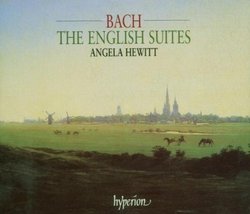| All Artists: Johann Sebastian Bach, Angela Hewitt Title: Bach: The English Suites Members Wishing: 1 Total Copies: 0 Label: Hyperion UK Release Date: 10/14/2003 Album Type: Import Genre: Classical Styles: Chamber Music, Forms & Genres, Suites, Historical Periods, Baroque (c.1600-1750), Classical (c.1770-1830) Number of Discs: 2 SwapaCD Credits: 2 UPCs: 034571174518, 034571174518 |
Search - Johann Sebastian Bach, Angela Hewitt :: Bach: The English Suites
 | Johann Sebastian Bach, Angela Hewitt Bach: The English Suites Genre: Classical
|
Larger Image |
CD DetailsSimilar CDs
|
CD ReviewsCharm over bravura Alan Lekan | Boulder, CO | 09/20/2005 (4 out of 5 stars) "According to lore, the "English" in these suites refers to some historical evidence that they were written for "an Englishman of nobility." Perhaps. While there is not so much style of the English in this music, the international flavors of Italy, Germany, Spain and especially France abound in these series of six suites consisting of several contrasting 'dance' movements. The Courantes, Bourrees, Menuets and Gavottes are quintessentially French, the Sarabandes of Spanish origin, the Allemandes from Germany and the French Gigue from Anglo roots in the 'Jig.' While their origins came from dance music of the courts and peasants of the 16th & 17th centuries, the dances of Bach's Suites were composed purely for instrumental, concert purposes. In her exquisite liner notes, Miss Hewitt summarizes Bach's huge talent for integrating and fusing these diverse, regional dance influences into one grand style: "Bach was able to combine the grace and refinement of French dance music with concerto elements borrowed from the Italians, yet subjecting it all to the German predilection for polyphonic writing at which he was the supreme master. Nowhere is this more beautifully demonstrated that in his six English Suites." Bach's English Suites are filled with much superbly crafted, complex and memorable music - from the haughtingly beautiful sarabandes to the highly rhythmic preludes and gigues. Unlike the six Partitas or French Suites, each of the English Suites begins with a prelude - but preludes that are quite technical and fast moving and hardly relaxed like those of Bach's WTC. And where the French Suites are more aristrocratic, restrained and elegant overall, the English Suites are definately more virtuostic - somewhat akin to the Partitas and Toccatas at times - but these alternating with the slower and contemplative sarabandes and allemandes. The deeply expressive writing Bach brought to the sarabandes is definately a highlight of the English Suites as is Hewitt's emotionally-emersed and plaintive playing of them. Suites No. 2 and 6 are perhaps the stars of the set - fantastic compositions that show off the keyboardist's technical virtues that Hewitt plays with dazzle, authority and supreme confidence. Her Suite No. 2 bursts forth with great energy and excitement - even moreso and more multifaceted than Martha Argerich's dynamic reading (DG). Particularly in the opening Prelude and later Bourree, Hewitt shows herself to be a master of drama and conception by her well-chosen, varying dynamics, swells and flutters that add great dimension and excitement to the music. In such kinetic movements, her clean, quicksilver passagework is second to none; and few find such heartfelt, expressive depth in the sarabandes. I have all of Hewitt's discography and rank the English Suites among my top 3 favorites - both for Bach's superb compositons and Hewitt's dynamic and sensitive playing. Compositions - 5 stars; Performance - 5 stars; Sound - 4 stars. This set scored a top 3-star rating and "Recommended Recording" citing in the 2005 Penguin Guide. The most articulate review I came across was written for the Bach journal, "The Goldberg," that also summarized mostly my take on this set: "Angela Hewitt writes of one of the gigues in this set that it should be rendered with "charm rather than bravura", and on another that it requires "clarity, precision, and a sense of line". These are apt descriptions of her own virtues throughout this set. Hewitt's interpretations are thoughtful and detailed, and might seem understated on first hearing. Her tone is consistently beautiful: she never displays the hard-edged, brilliant sonorities which Perahia occasionally exploits to great effect in his set. Most of her tempi are moderate-to-slow. She achieves a seemingly effortless clarity, gently underlining (rather than boldly highlighting) inner lines and motifs. For all her seeming moderation, Hewitt exploits most of the modern piano's resources, displaying a wide range of articulation, dynamics and colours. She rarely projects immediate contrasts - sudden transition from loud to soft, or from full-toned to delicate; instead, she prefers constant nuances, subtly shifting attention between different strands in the texture, and cumulatively, almost imperceptibly, delineating a movement's progression. Repeats are often varied (including additional ornamentation). Through these subtle means Hewitt projects the different characters of individual dances, as well as those of entire suites - from the radiant serenity of the Fourth Suite to the depth and grandeur of the Sixth. Another virtue of this set is the liner notes. Hewitt's enthusiasm for these works is conveyed in a sometimes conversational style of writing -- a few sentences read more like an interview transcription than like a written essay. This might bother some readers, though I got used to it fairly quickly. They're both enjoyable and informative, and give some insight into her musical choices as a performer. The piano's sound, and the recording, are sometimes over-resonant, and occasionally I would have preferred more incisive articulation. But these minor reservations hardly detracted from my enjoyment of these moving performances. This is one of the finer achievements in Hewitt's highly-acclaimed Bach series. Fierce competition from Andras Schiff and Murray Perahia notwithstanding, this might well be the finest set of the English Suites on the piano." Uri Golomb " Elegant Bach M. Levitt - classical music buff | Philadelphia, PA | 01/09/2005 (5 out of 5 stars) "The English Suites are the first of three sets of suites Bach wrote for the keyboard, the others being the French Suites and Partitas.
Of the three sets of suites, the Partitas are perhaps the greatest set, the French the most accessible. I tend to prefer Bach on piano (to harpsichord). I think the richness of Bach's music comes over better on piano, assuming of course that the pianist is very good in Bach. Angela Hewitt's set of the English Suites is elegant, songful and pianistic;the more I listen to Hewitt, the more I enjoy her. I think Murray Perahia's set of the English Suites is more personal than Hewitt, very compelling, but not better. Rosalyn Tureck (on VAI) offers an unforgettable, marvelous performance of the English Suite no.3 coupled with superb excerpts of the Well Tempered Clavier, the Italian Concerto etc. Of Hewitt's Bach recordings I know, the very best are of the Well Tempered Clavier (Books 1 and 2) (try hearing Rosalyn Tureck in them too!). I think we are fortunate today to have wonderful Bach recordings by Tureck, Hewitt, and Perahia (also Piotr Anderszewski in Bach Partitas 1,3 and 6 on Virgin). " |

 Track Listings (19) - Disc #1
Track Listings (19) - Disc #1


